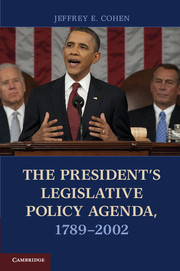Book contents
- Frontmatter
- Contents
- List of Figures
- List of Tables
- Introduction
- Chapter 1 The President's Legislative Policy Agenda
- Chapter 2 Studying Agenda Building
- Chapter 3 A Theory of Presidential Agenda Building and the Congressional Response
- Chapter 4 The Size of the President's Agenda, 1789–2002
- Chapter 5 The Substantive Content of Presidential Agendas
- Chapter 6 Divided Government and Presidential Policy Moderation
- Chapter 7 From the White House to Capitol Hill
- Chapter 8 Conclusion
- Bibliography
- Index
Chapter 7 - From the White House to Capitol Hill
The Congressional Fate of the President's Legislative Proposals
Published online by Cambridge University Press: 05 November 2012
- Frontmatter
- Contents
- List of Figures
- List of Tables
- Introduction
- Chapter 1 The President's Legislative Policy Agenda
- Chapter 2 Studying Agenda Building
- Chapter 3 A Theory of Presidential Agenda Building and the Congressional Response
- Chapter 4 The Size of the President's Agenda, 1789–2002
- Chapter 5 The Substantive Content of Presidential Agendas
- Chapter 6 Divided Government and Presidential Policy Moderation
- Chapter 7 From the White House to Capitol Hill
- Chapter 8 Conclusion
- Bibliography
- Index
Summary
The president's greatest influence over policy comes from the agenda he pursues and the way it is packaged.
Jon R. Bond and Richard Fleisher, The President in the Legislative Arena,1990, p. 230
To interpret Bond and Fleisher's famous quote, we ask what in particular is it about the president's agenda and the way that it is packaged that provides presidents with policy influence. This book is an attempt to better specify the factors that affect presidential agenda building and how that decision process affects presidential success with Congress. Recognizing that the presidential agenda-building process is complex and multifaceted, I have focused deeply on how the congressional environment influences presidential agenda building. I start with a simple proposition, that presidents want to win in Congress and avoid defeat. The congressional environment, especially whether their party controls Congress, provides presidents with useful information about how receptive Congress is to their legislative proposals. In general, Congress is more receptive and open to the president's proposals when his party is in control than when the opposition's party is in control.
Expectations for success, partly a function of party control in Congress, therefore condition the president's agenda. This theory of congressional anticipations leads to several hypotheses regarding the shape of the president's agenda. The previous chapters presented and tested these hypotheses, finding support for them. First, when expectations for success decline, the president's agenda shrinks as presidents withhold proposals destined for defeat. Second, presidents are more likely to modify their proposals, making them more acceptable to more members of Congress when expectations of success are low as opposed to high. Because expectations for success are lower during divided compared with united government, the president's agenda will be smaller and more moderate when confronting an opposition-controlled Congress than when the president's party controls the legislature.
- Type
- Chapter
- Information
- The President's Legislative Policy Agenda, 1789–2002 , pp. 208 - 255Publisher: Cambridge University PressPrint publication year: 2012

